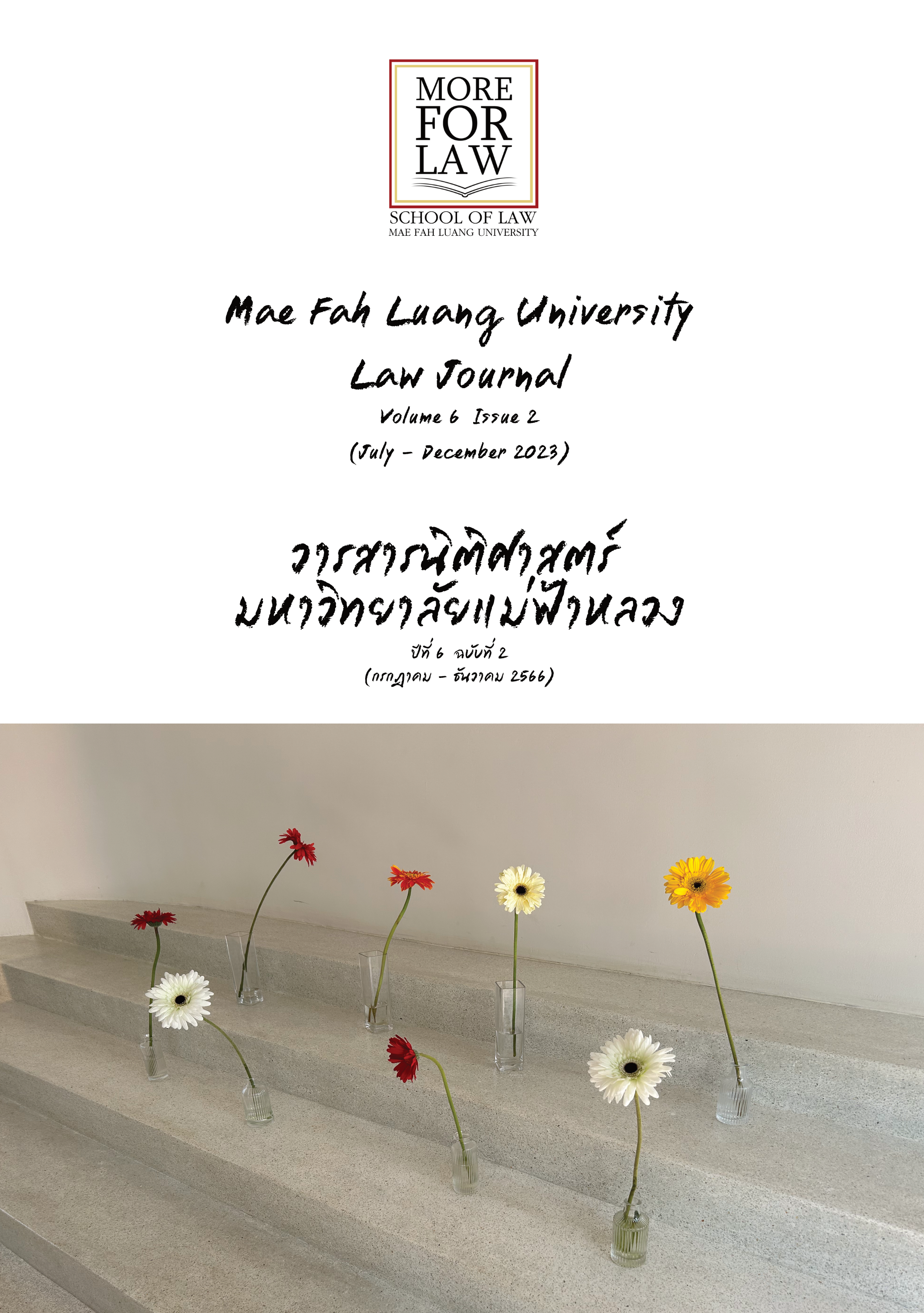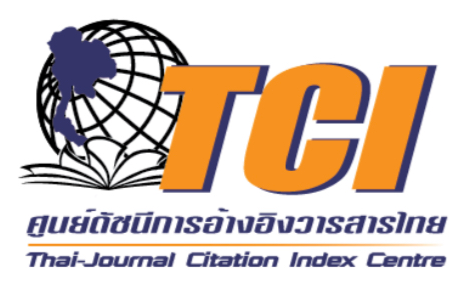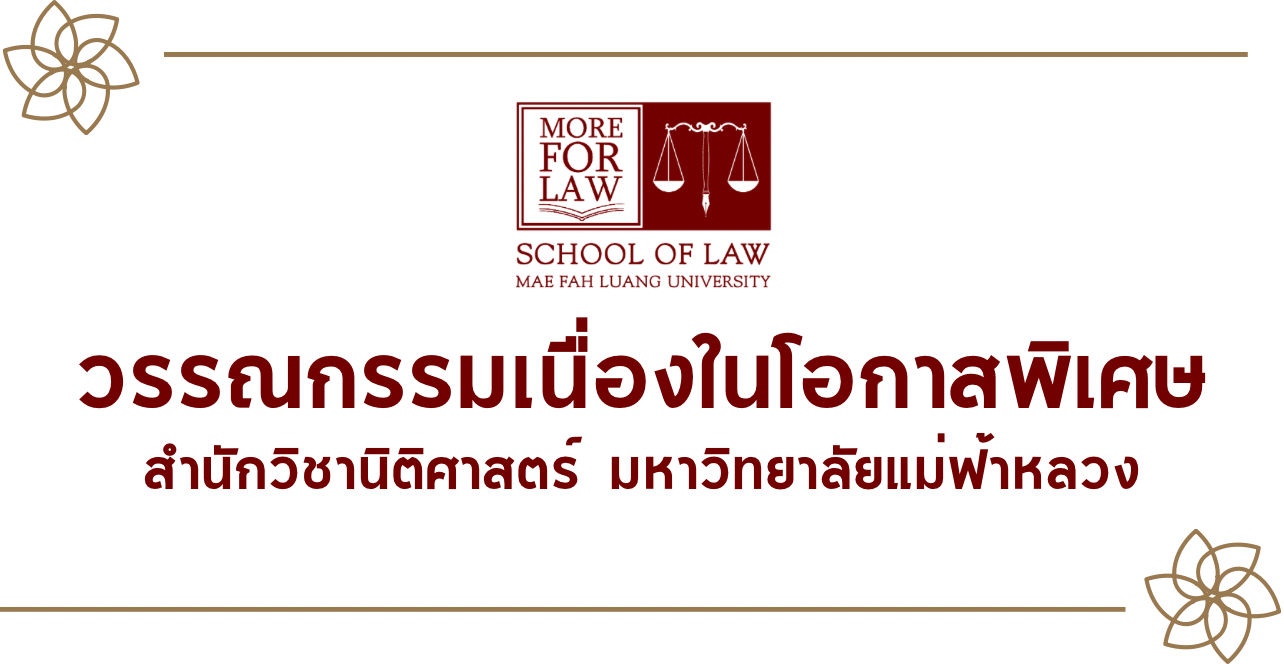การจัดการมรดกรูปแบบดิจิทัลในยุคแห่งการแปรรูปทางดิจิทัล: “พินัยกรรมดิจิทัล” คืออะไร?
DOI:
https://doi.org/10.14456/mfulj.2023.14คำสำคัญ:
มรดกรูปแบบดิจิทัล, แบบแห่งพินัยกรรม, กฎหมายมรดกบทคัดย่อ
บทความเรื่องนี้มีวัตถุประสงค์เพื่อวิเคราะห์สถานะทางกฎหมายของคำว่า “พินัยกรรมดิจิทัล” ซึ่งปรากฏในบทความทางเทคโนโลยีภาษาไทยจำนวนมากที่ได้เขียนถึงสิ่งที่เรียกว่า “Digital Legacy” อันเป็นฟังก์ชันใหม่ของบัญชีโซเชียลมีเดียและโทรศัพท์มือถือสมาร์ตโฟน ภายใต้ประมวลกฎหมายแพ่งและพาณิชย์ของประเทศไทยว่ามีผลทางกฎหมายอย่างไร ที่มาของการหยิบยกประเด็นปัญหาทางกฎหมายของการทำ “Digital Legacy” เกิดจากการที่ประเทศไทยอยู่ในยุคแห่งการแปรรูปทางดิจิทัลโดยมีความพยายามที่จะผลักดันระบบเศรษฐกิจของประเทศไปสู่ความเป็นเศรษฐกิจดิจิทัล ประชากรไทยมีแนวโน้มการใช้อินเทอร์เน็ต ใช้โทรศัพท์มือถือสมาร์ตโฟน และใช้สื่อโซเชียลมีเดีย เพิ่มมากขึ้นเรื่อย ๆ แม้ในประเทศไทยจะยังไม่เคยมีการฟ้องร้องคดีเกี่ยวการขอเข้าถึงบัญชีโซเชียลมีเดียอันอาจเรียกได้ว่าเป็นมรดกทางดิจิทัลของบุคคลที่ตายไปแล้วดังเช่นที่ได้เกิดขึ้นจริงในต่างประเทศ ซึ่งผู้เขียนจะได้ยกตัวอย่างคดีที่มีการฟ้องร้องและศาลมีคำพิพากษาแล้วในประเทศสหรัฐอเมริกาและประเทศเยอรมนี ประเด็นนี้ก็ไม่ใช่ประเด็นที่ไกลตัว เพราะศาลฎีกาของประเทศไทยได้เคยมีคำตัดสินเกี่ยวกับการส่งข้อความโต้ตอบทางเฟซบุ๊กว่ามีผลทางกฎหมายเป็นการแสดงเจตนาที่มีหลักฐานเป็นหนังสือมาแล้ว โดยในบทความนี้ผู้เขียนจะวิเคราะห์ว่า ภายใต้ประมวลกฎหมายแพ่งและพาณิชย์ไทย “Digital Legacy” ถือเป็นพินัยกรรมแบบใดแบบหนึ่งหรือไม่ หากคำตอบคือไม่ “Digital Legacy” มีผลบังคับได้ตามกฎหมายภายใต้หลักกฎหมายอื่นในประมวลกฎหมายแพ่งและพาณิชย์หรือไม่
Downloads
เอกสารอ้างอิง
จิตต์สุภา ฉิน, Digital Legacy: ทิ้งไว้ให้คนข้างหลัง [ออนไลน์], แหล่งที่มา: https://www.matichonweekly.com/column/article_434422
จีระพร สุภะกะ, พินัยกรรมแบบอิเล็กทรอนิกส์, (วิทยานิพนธ์ปริญญาโท หลักสูตรนิติศาสตรมหาบัณฑิต คณะนิติศาสตร์ มหาวิทยาลัยธรรมศาสตร์, 2564).
ระบบสืบค้นคำพิพากษา คำสั่งคำร้องและคำวินิจฉัยศาลฎีกา, คำพิพากษาศาลฎีกาที่ 6757/2560 [ออนไลน์], แหล่งที่มา: http://deka.supremecourt.or.th/
รักษ์พงษ์ ฉันท์ภาวัต, Digital Legacy พินัยกรรมดิจิทัล [ออนไลน์], แหล่งที่มา: https://medium.com/@tiscomastery/digital-legacy-80682700e696
Agence France-Presse, German Court Says Parents Can Inherit Facebook Data [Online], Source: https://www.dw.com/en/facebook-court-rules-parents-have-rights-to-dead-daughters-account/a-44642230
Damien McCallig, Facebook after Death: An Evolving Policy in a Social Network, International Journal of Law and Information Technology, Volume 2 Issue 2 (2014).
H. Arigato (หงส์ฟ้า), ยกมรดกออนไลน์ ด้วยการทำ ‘พินัยกรรมดิจิทัล’ [ออนไลน์], แหล่งที่มา: https://www.altv.tv/content/pr/6336c1e33f24a6b6210db4a8
Marcus Dittmann, German Federal Court of Justice: Facebook Must Grant Heirs Full Access to a Deceased Person’s Account (Update 2020) [Online], Source: https://ihde.de/en/german-federal-court-of-justice-facebook-must-grant-heirs-full-access-to-a-deceased-persons-account-update-2020/
ดาวน์โหลด
เผยแพร่แล้ว
รูปแบบการอ้างอิง
ฉบับ
ประเภทบทความ
สัญญาอนุญาต
ลิขสิทธิ์ (c) 2023 วารสารนิติศาสตร์ มหาวิทยาลัยแม่ฟ้าหลวง

อนุญาตภายใต้เงื่อนไข Creative Commons Attribution-NonCommercial-NoDerivatives 4.0 International License.






